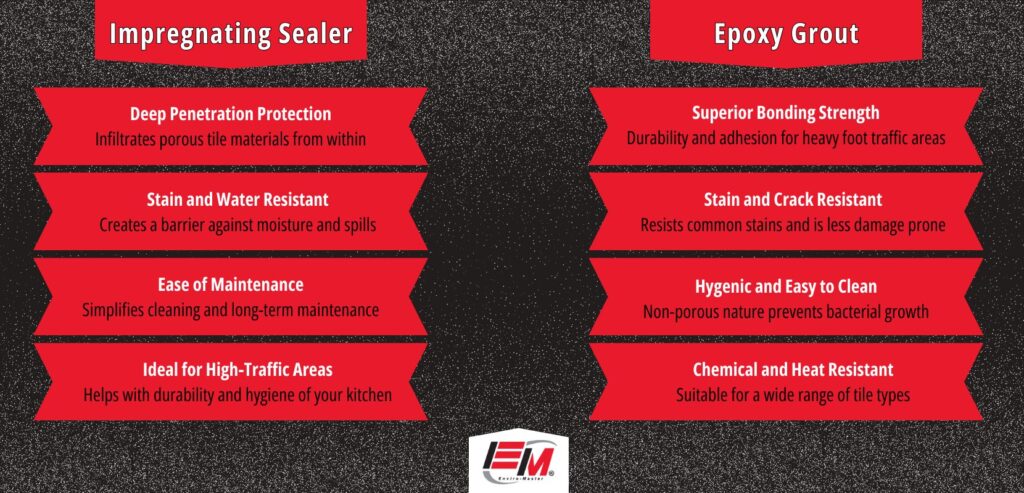Every restaurant owner knows that the heart of their business isn’t just the food, but the kitchen where it’s prepared. A well-designed kitchen is key to maintaining efficiency, safety, and hygiene. While many factors come into play in kitchen design, one critical element that’s often overlooked is the kitchen floor. The choice of commercial kitchen tiles can significantly impact not only the aesthetics of your business but, more importantly, health conditions and safety conditions.
Choosing the right kitchen tile for your commercial space demands consideration of several factors – slip resistance, high-temperature endurance, ease of cleaning, and durability to withstand heavy foot traffic, just to name a few. These are crucial considerations for a smoothly running, efficient, and safe kitchen.
Enviro-Master: The Experts in Health and Safety
With over a decade of protecting our customers with the safest and most cost-effective health and safety products, we are fully equipped to guide you through selecting your commercial kitchen tiles. We understand that ensuring the safety of your business, your employees, and your customers from hazards is your top priority, and we’re here with the expertise you can count on.
As your expert partner, we stand behind our unique processes and trusted expertise to provide you with the perfect solution for the health and safety needs of your restaurant, from selecting the perfect flooring material to preventative maintenance.
Types of Commercial Kitchen Tiles
There are many choices of tiles to cater to your specific needs for your commercial kitchen. While some are excellent choices for certain applications, others might perform better under different conditions. Each type of tile comes with its own set of advantages and disadvantages.
Quarry
Pros:
– High durability and cost-effectiveness
– Resistance to water and stains
– Excellent slip resistance
– Suitable for high foot traffic area
– Heat resistance for commercial kitchens
Cons:
– Limited design options
– May have a rough appearance
– Typically available in earthy tones only – like red, brown, gray
Ceramic
Pros:
– Versatile and comes in various finishes
– High durability
– Resistance to heat and heavy traffic
– Easy-to-clean, smooth surface
Cons:
– Can be less slip-resistant than quarry tiles
– Not as heat-resistant as porcelain tiles
– Grout lines may require maintenance
Porcelain
Pros:
– Superior durability
– Exceptional resistance to water and stains
– Excellent heat and heavy traffic resistance
– Ideal for spill-prone areas
Cons:
– Higher initial cost
– May be more challenging to install
– Requires professional installation
– Grout lines may need sealing
Natural Stone
Pros:
– Elegant and refined appearance
– Wide range of options (granite, marble, etc.)
– Impregnating sealer can mitigate staining
Cons:
– Higher maintenance costs
– Prone to staining if not sealed properly
– Porous nature may trap dirt and bacteria
– Limited slip resistance
Other Flooring Options
Aside from tiles, other flooring options like vinyl flooring and concrete flooring also find relevance in commercial kitchens. Vinyl flooring, for instance, boasts low maintenance, comfort, and a variety of design options. Concrete, on the other hand, is valued for its longevity and high customization capabilities when it comes to finishes and colors.
Note that the suitability of each tile type depends on the specific needs and preferences of your commercial kitchen, so consider these factors when making your choice.
The Relevance of Commercial Kitchen Tiles to Restaurant Owners
Just as an experienced staff is the core of a successful restaurant, well-chosen commercial kitchen tiles are the foundation of a safe and efficient kitchen. From the type of tile to their unique features – your kitchen floor can impact your business in many ways.
When choosing tiles for your establishment, it’s essential to consider their distinct features and how they align with your restaurant’s specific needs. Depending on your kitchen operations, certain types of tiles may offer more advantages than others.
Quarry tiles, for example, might be your first choice if durability and slip resistance are high up on your priority list, especially with their inherent rough texture which aids in slip resistance.
Ceramic tiles can be an excellent choice if you seek a balance between durability, style, and ease of maintenance.
Porcelain tiles, often deemed the premium grade among commercial kitchen tiles, can level up your kitchen’s aesthetics while maintaining a high level of resistance to common kitchen mishaps – like spills and stains.
If your restaurant kitchen also doubles as a showcase for your customers, you might want to consider natural stone tiles to add an extra touch of elegance. However, this choice comes with higher maintenance costs due to the porous nature of the material.
But it’s not just the type of tile that matters. You must also consider other factors such as the tile’s slip resistance, especially in food preparation areas, and the ability to withstand high temperatures. After all, restaurants are high-traffic areas, and your kitchen floor must be prepared to handle that.
Commercial Kitchen Flooring Maintenance
So, you’ve chosen your commercial kitchen tiles, and they look perfect! But did you know that a significant aspect of maintaining your kitchen’s optimum health and safety conditions is how you treat your flooring post-installation?
Impregnating sealers, epoxy grouts, and efficient cleaning regimes all play an integral part in prolonging the life of your tile flooring and keeping it safe and hygienic.
Impregnating Sealer – Your First Line of Defense for Porous Flooring
Natural stone tiles, while beautiful, have a major flaw – their porous nature, which makes them more stain-prone and harder to clean. However, coating your natural stone tiles with a quality impregnating sealer fills their pores, preventing the accumulation of dirt and grime, making them easier to maintain – an essential consideration, especially in high-traffic areas, like your kitchen. Beyond stone, the sealer can also be applied to grout, concrete, tile, and more.
Epoxy Grout – An Essential Companion for Your Tiles
Grout lines might seem insignificant, but the role they play is far from it. Using epoxy grout to fill and seal the gaps between your tiles not only adds strength and rigidity but it’s also more resistant to cracks and stains in comparison to traditional grouts. Thanks to its non-porous nature, it’s also more effective in preventing bacteria and dirt, keeping your kitchen spotless for a more extended period.
Maintenance Costs vs. Longevity and Durability
Whether you’ve opted for natural stone or ceramic tile for your commercial kitchen floor, factoring in the maintenance costs is crucial. Investing in more durable choices like porcelain or quarry tile often means less frequent replacements and lower long-term maintenance costs.
We’re Here to Help
While the primary purpose of commercial kitchen tiles is to maintain safety and provide a smooth surface for your kitchen staff to work on, they also have the potential to enhance the visual appeal of your kitchen space. The best part? At Enviro-Master, we’ll take care of the maintenance.
- Re-Fresh Commercial Power Washing: We use a heated treatment to sanitize your floors and create a healthier environment. With customized cleaning solutions, we can service any type of kitchen floor! This service is great for cutting through built-up grease.
- Micromax: The combination of microfiber technology and specially formulated disinfecting agents is the core of our Micromax Floor cleaning service. Our cleaning solutions are applied by our professional cleaners, ensuring your floors are not only visibly spotless but also free from harmful contaminants.
- Tile and Grout: By removing calcium deposits, we not only remove hazardous grease but also reduce odors you may not realize are coming from your tile floors. Our industrial tile and grout cleaning products safely remove buildup, while reducing the chances for your staff and customers to slip and fall.
Maintenance Tips for Your Day-to-Day
- Use the right cleaning products. Using the wrong product can lead to discoloration or damage to the tile surface.
- Adopt the right cleaning technique. Routine sweeping and mopping can help maintain the luster of your tiles and extend their lifespan.
- When in doubt, ask for advice. Professionals, like our team at EMS, know best when it comes to maintaining your commercial kitchen tiles.
Keep Your Floors Pristine with Enviro-Master
Your commercial kitchen is more than just a food preparation area. It contributes significantly to the overall success of your restaurant. At Enviro-master, we’re in the business of not just providing but protecting. We stand by our unique processes and trusted expertise. We promise to provide you with the best solutions for your commercial kitchen flooring: services that guarantee the safety of your staff and customers.
With Enviro-Master, you’re not just choosing a tile; you’re choosing a comprehensive solution tailored to your needs. Here’s to your restaurant’s safety, efficiency, and success. Contact us for more info about how we can help service your commercial kitchen!



